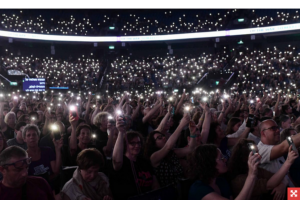What a ‘peace summit’ reveals about the state of the Israeli left

People attend a peace conference at the Yad Eliyahu Arena in Tel Aviv, 1 July 2024
Orly Noy writes in +972 on 7 May 2025:
This weekend, a coalition of 50 Israeli peace and shared-society organizations will convene in Jerusalem for the “People’s Peace Summit” — a two-day gathering that aims, according to its website, to “[work] together with determination and courage to end the Israeli-Palestinian conflict through a political agreement that will ensure both peoples’ right to self-determination and secure lives.”
Here in Israel-Palestine, we live in dark and bitter times, the likes of which we have never experienced before. In these circumstances, such an impressive show of force by the reawakened left is undoubtedly important and meaningful, and I tip my hat to anyone working to create change toward a better future.
And yet, it must be acknowledged that the conference will take place amid an ongoing genocide, one that has already claimed the lives of tens of thousands of Palestinians in Gaza, and is likely to escalate even further in the near future. After carefully reviewing the conference’s densely-packed program of activities and panels, the word “Gaza” appears in only a single event, titled: “Peace After October 7 – Voices from the Gaza Envelope and from Gaza,” featuring “[Israel] residents of the Gaza border area and survivors of the massacre, along with video messages from peace activists in Gaza.”
More than a year and a half into Israel’s systematic annihilation of the Strip, the only victims organizers of the event seemed willing to fully acknowledge are the Israeli victims of the October 7 massacre. Gazans — those facing a genocide — must be designated as “peace activists” in order to be given legitimacy to voice their perspective before the attendees.
This raises some troubling questions: How does the “peace camp” conceive of its role in these unprecedented times? And even more fundamentally, does it even understand the magnitude of the genocidal moment in which we find ourselves?
Facing a new reality
Perhaps it’s the inclination to be “of the people” which led organizers to choose such sterile and feel-good titles for so many of the conference’s events: “Woodstock for Peace,” including a “full day of connection to the earth, nature, peace, and hope”; “Israeli and Palestinian youth present their perspectives on the word ‘peace’”; “There is a Path”; “Hope from Jerusalem”; and so on.
